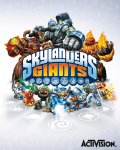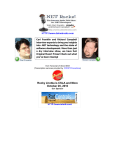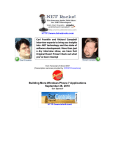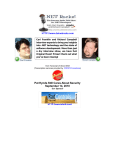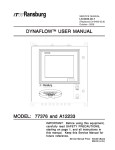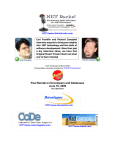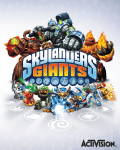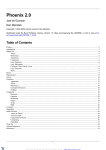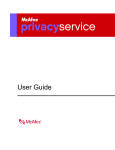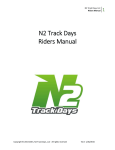Download The Future of Web Apps from Tech Ed New Zealand October 19, 2010
Transcript
HTTP://www.dotnetrocks.com Carl Franklin and Richard Campbell interview experts to bring you insights into .NET technology and the state of software development. More than just a dry interview show, we have fun! Original Music! Prizes! Check out what you've been missing! Text Transcript of Show #603 (Transcription services provided by PWOP Productions) The Future of Web Apps from Tech Ed New Zealand October 19, 2010 Our Sponsor HTTP://www.telerik.com/ The Future of Web Apps from Tech Ed New Zealand October 19, 2010 Lawrence Ryan: .NET R o c k s ! ep i s o d e # 603 from TechEd New Zealand, recorded live Wednesday, September 1, 2010. Andrew Tokeley: I'm Andrew Tokeley. I've been involved in software development for quite awhile and predominantly in the Microsoft platform and I am currently working for Xero. [Music] Lawrence Ryan: This episode is brought to you by Telerik, by Haystack a n d b y Franklins.NET Training Developers to Work Smarter and now offering video training on Silverlight 4.0 with Billy Hollis and SharePoint 2010 with Sahil Malik, order online now at franklins.net. And now, here's Richard Campbell. Richard Campbell: Hey, New Zealand, welcome to .NET Rocks! Wow, my goodness, you guys are enthusiastic and I've heard that all you Kiwis are so restrained. So we're talking about the future of web development and we have a panel of esteem experts sitting here. Let's start closest to me. Introduce yourself and what you know. Chris: Hi, I'm Chris O'Donohue. I've got a history of, you know, development in ARC strategy for about quite a few years now, run an ISP in the early '90s. Richard Campbell: That really like you. Andrew Tokeley: Yeah, yeah, yeah. Adrian Krzyzewski: I think he's the only other guy who works for Xero here. Andrew Tokeley: So yeah, that's kind of a good position to be in, in this topic of future web apps. You know, Xero is doing pretty well and have that mark in the future that's quite interesting. So I'm a Silverlight MVP so that's also relevant I guess to what might be the future. Richard Campbell: the web. Uh-hmm. Definitely impacting Andrew Tokeley: And I was terrified for coming here that would be with the Twitter phenomenon that's happening that you get instantaneous feedback on your performance on the stage and now we have the .NET Rocks! recording as well which will go even further than... Richard Campbell: When it wasn't cool to do so. Chris: it was fun. Not seemingly wholesome, but Richard Campbell: It's all right. We'll make sure we circulate your email address on the show as well. Richard Campbell: Yes. Andrew Tokeley: Chris: And it's been a favorite of a ton of major media companies to sort of charge their own mind in their innovation and recently in-charge of a small international software development. Richard Campbell: Awesome. Next stop. Adrian Krzyzewski: Hi, I'm Adrian Krzyzewski. I work for TV and such, soon to leave and starting a new company. Okay, okay. I still get an app... Richard Campbell: Yeah, you do. And certainly the last but not the least. Darren Wood: My name is Darren Wood, I'm the talking funking nerd and also a Mac user. I'm hoping that you guys will just protect me from the hoots. I'm a web standard nerd. I design websites all day. I build using HTML and CSS so yeah, web standards. Adrian Krzyzewski: Yeah and while in discussion, you know, in architecture. Richard Campbell: All right. Don't look at me. What did I say? Okay, I didn't say anything. All right, where shall we begin? Obviously all of this is now simple, the future of the web is HTML 5.0 and we could go home, right. Richard Campbell: Andrew Tokeley: Yeah, right. Richard Campbell: Andrew agrees. Richard Campbell: In web space? Okay. Adrian Krzyzewski: So I'm an enterprise architect. I've been involved in the creation of TV insert, coder inserts and TV inserts, on demand and so now in the senior structure of architecture and stuff. Richard Campbell: Andrew Tokeley: Well, it's certainly not the future but it's the way it's going to go. I mean, HTML 5.0 used to be called Web Application. Excellent. Richard Campbell: Transcription by PWOP Productions, http://www.pwop.com Right. Page 2 of 16 The Future of Web Apps from Tech Ed New Zealand October 19, 2010 Andrew Tokeley: And they basically took it away and rolled that into HTML. You know, it's least mocking documents up online and more creating applications, usable functional bits of things online and it doesn't necessarily mean a web browser. It could be your cell phone, your telly, your fridge if you're that fancy. But it's certainly an exciting way forward without having to bother about plugins or any sort of proprietary things. But it's the more corporate and Apple and Microsoft is sort of finding it difficult to come to terms with ARC for example which is the proposed open format for video and audio. At the end of the day, the best one is going to win. I mean, if you look at something like the GIF, PNG argument, personally I'm going to go with PNG outright. Richard Campbell: Darren Wood: Not only because it's open, but because it's a fast period technology than yeah... Really. Richard Campbell: Right. Andrew Tokeley: What's really nice before this, when we talk about it you didn't mention plugins once. Now that's... Richard Campbell: It's nice when those two things go together, but they don't always go together. Richard Campbell: Well, the game is on you. Darren Wood: Andrew Tokeley: Everything... Richard Campbell: We get into the Betamax, VHS to-date where Betamax was cool for some period but Sony crippled it with its low licensing requirements. No two ways around that. The inferior technology won and I wonder if we're up against the same thing here. To me the issue seems to be the threat of patent violation around those codecs that the fact that we have H264 which we all know and understand but the best feature of that whole thing is we know that a licensing lies with it even if it's the next best, at least it's known. Adrian Krzyzewski: Where's the plugin then? Richard Campbell: Because if we're still battling in the HTML 5.0 stand, there's not so much plugins. But codecs. I mean, what video format are we going to play and that effectively now we're back to the plugin requirement. I'm going to have to install something to make that work. Darren Wood: Yeah, that is true. That's a constant battle. I think H264 is going to win. That's right, yeah. Darren Wood: But there are, of course, the licensing issues that come with that. Adrian Krzyzewski: I think you're on to a good point there, but I think it's not so much the technology that's sitting behind it. It's possibly who becomes the fastest content aggregator, who's got the most content, who's got the greatest fall in the content is most interesting to the audience. Richard Campbell: Andrew Tokeley: Richard Campbell: I hope so. Yes. Darren Wood: I'm probably not the best person to talk about those things, but it is a concern. Adrian Krzyzewski: Well, maybe not. Richard Campbell: Adrian Krzyzewski: Yeah, it certainly is a concern and that, you know, from broadcaster's perspective, transcoding into multiple transcode format is a cost you don't want to have to cover and tie to working bottom line. You're saying YouTube works? YouTube... Richard Campbell: Right. Every time you switch formats, you have other problems as well. There's certainly been a drive towards like a completely open codec, but it doesn't seem like anybody is willing to support that. Adrian Krzyzewski: But then there's t h i s commercial content and there's free content. The commercial content is the stuff that people, you know, the Lost, the Desperate Housewives, the stuff that people kind of want to watch for free and they're getting for free. If you aggregate that on the web, if you’re the big volume house they can get to sit down and pass to anybody else and you propose a particular standard, then you're not going to win in that particular standard. Darren Wood: Well, open source and open formats are I think quite scary because you've got a bunch of frankly pizza-smelling nerds sitting in the backroom doing something magical and a lot of times like Firefox is happy to adopt that because they themselves are an open source sort of organization. Richard Campbell: That's another element of it. You know, I think we've gone down a particular area here at which certainly we try to poke holes in HTML 5.0 but I think it's pretty hard to resist its long term potential. But isn't there room for Silverlight and, heaven forbid, Flash in the foreseeable future? Transcription by PWOP Productions, http://www.pwop.com Page 3 of 16 The Future of Web Apps from Tech Ed New Zealand October 19, 2010 Adrian Krzyzewski: Yeah. A good question to ask and what we ask ourselves when we got together before this was what is a web application. So we post the question of the future of web applications and it's actually quite harder to find now. It used to be, not that long ago, that the web application was simply an application to live through the browser and then obviously HTML was, you know, it's above, everyone else stands by its approach. I mean, you have the widest possible reach, it was all goodness. But I guess, if we're thinking about the future of web applications, it then becomes, well, I think it becomes more from the browser. It becomes what's driving the applications on your mobile devices. You've got lots of native apps defined on there, live native apps defined on there and so it does a more of an acceptance of non-HTML based applications driving your x's to the darkroom services of the web and so all of us just think of web applications. It wasn't an old fashion way. It's almost like a snot client, a thin client mentality but bigger than just this is HTML cool, or is Silverlight cool, or is Flash not cool. I think they solve different problems. Richard Campbell: Well, let me throw this at you in a different way then because I think you're hinting along the same lines which is does the web application even exist anymore. The same way is there any application today that doesn't u s e networking in some respect, and if it's on the network the web is not a big jump. It's only just two different protocols or anything there. It isn't every application now, effectively a web application in that definition. The only question mark there is baby browser or not, but I look at ClickOnce delivering perfectly on the client apps but installed over the web. What is it? Is there anything that's really not a web application anymore? Adrian Krzyzewski: That's a mess of gray area. In the Silverlight space, in WPF, it's even more distinct because it's very obvious, that graying of the space. Richard Campbell: Right. Adrian Krzyzewski: You go from a clog-in in a browser and then there's a gradation of out of browser. They now becomes a pure WP effect and so you have this adhere of, you know, Windows is trying to save an app here or using similar technologies and that sort of continual of stuff. I dream of a future of web apps where I go following new web app and I'm coding away and then I go, you know, I slip sometime then, I trek, I go, okay, I'm going to target that to the Windows Phone or I'm going to target that to like BizTalk. Just like when you target a framework now, you're building a BizTalk app or ASP.NET sites and you choose the targeted framework and all of a sudden you target .NET 4.0 Transcription by PWOP Productions, http://www.pwop.com and you have now a reference .NET 4.0 assembly. So you could do some goodness there. Now that would be kind of cool on targeting the BizTalk and now I already have access to those assemblies that will run on the BizTalk. Similarly, if I'm targeting the phone it will be nice to only have those that can target that device. Andrew Tokeley: It's almost describing HTML 5.0 there, you see. like you're Adrian Krzyzewski: If it weren't for the fact that the future devices are going to run these applications, it's going to be there. But those devices that we're using, you think of television, you think of fun, all those devices require applications that run with them to also talk to those things, to read the theme and know where you are, to list up and some of those things they come into HTML and that's really exciting. But I wonder. It's going to be interesting. The HTML 6.0 and 7.0, are they going to really allow that sort of interaction with the device that they're running on and yeah, it's kind of the same box now, that's kind of not allow them coming about. Darren Wood: Well, maybe this is the creative non-technical side of me coming through. But for me, HTML is not even a programming language. It's markup. Richard Campbell: Well, we've been saying that for years but for an entirely different reason, but yeah. Andrew Tokeley: Indeed. Darren Wood: Well, and I think that's a n important point to make. It's you can go through a bit down and learn how to program and do these things correctly. I say correctly but as lack of proper application. But HTML sees it's really easy to achieve these things without getting too involved specifically as creatives. It's the perfect solution. However, there's a flipside to that. There's the Dreamweaver, the Front Page that's going to mingle and produce some horrific things. So it's a fine line and I think the kids today are finding this... Sorry, why did I say now? The kids struggling... Sorry. I think it's just becoming more accessible and easy to produce these rich applications without having to rely on a hot/cool programming background. Andrew Tokeley: though. Sure. That's just the front-end Darren Wood: It is the front-end and that's what the consumers use. Andrew Tokeley: Exactly and it's how much more that's sitting behind there. Page 4 of 16 The Future of Web Apps from Tech Ed New Zealand October 19, 2010 Darren Wood: Yeah. Andrew Tokeley: The Cloud obviously brought a different perspective that hasn't been there so much in the past, or is not so accessible as it is in the past. By Cloud I mean consumerable services, not just SAS applications. Darren Wood: Yup. Richard Campbell: Well, and this sort of begs a question as to the different side of this whole conversation around future web apps which is the same way that HTML 5.0 seems to be blowing up the story of what the clients are going to be like. Is Cloud blowing up the life of the ISP? Why are we going to need ISPs if everything is living in one of four major Cloud providers? Adrian Krzyzewski: Well, I doubt it's going to be one of four because of each provider and things like that. But web space is going to go back to access front page. Richard Campbell: You think we're going back to... Richard Campbell: S o w e 're counting on the incompetence of Microsoft's provisioning to keep them in business. Adrian Krzyzewski: Not example, you know... Richard Campbell: Amazon will hurt... just Microsoft. O h , t h e r e 's lots of, For yeah, Adrian Krzyzewski: O o h , p r o g r a m m e r s a r e useless. Richard Campbell: You know we better survey the room here. How many people consider themselves a web developer in this room right now? So that's about maybe a third. How many considers themselves infrastructure experts? Round that with web infrastructure. Very, very few. So the rest of you are just happy to be here? Are there other roles? Like we're still missing about two-thirds of the room. Just regular web artist? Oh, how many designers? Most guys are here. Darren Wood: Just developer, rather than a web developer. developer Adrian Krzyzewski: Access. Richard Campbell: Access? Adrian Krzyzewski: You know, like providing like access to the middle. Richard Campbell: Right. I would think that maybe they pick up a piece of the Cloud. They run their own... Adrian Krzyzewski: I think they'll try but, you know, certainly for big commodity colos, I think that will enrich it. You know, I think it can config with the end results on Microsoft... Richard Campbell: Right. So the same way that most ISPs don't own the IP addresses per se. They're licensing from ICANN and so forth and they generally don't own their own wire. They'll eventually not own their own servers. Adrian Krzyzewski: Yeah. Richard Campbell: So why did they exist? Adrian Krzyzewski: Because consumers can't get online by themselves. Richard Campbell: Right. Adrian Krzyzewski: They need help. Transcription by PWOP Productions, http://www.pwop.com Richard Campbell: Just a regular developer. Yeah. Primarily put themselves as developers. We still haven't got half the room. How many people's arms can't be lifted above their heads? There we go, okay. So now we're seeing they were loud for the Welcome to .NET Rocks!, but they're a little more shy when you want to categorize. Adrian Krzyzewski: Yeah. explaining from above. Well, that's a lot of Richard Campbell: There you go. I don't want to be any particular species. Chris: That's right. But I don't know. I don't really care about the future lanes to Skyball, the exit provision and who's going to... Well, I'll tell you, that's a different conversation a wee bit. So I think some of the major issues like we talk about earlier, what is a wee bit, is, you know, like we talk a lot about presentation of like HTML 5.0 is a direct replication on the BizTalk, and then when does the logic start, when does the data start. You know, I dream before I talk back consumption services at the Cloud or it might be consumption of the speechless service from an Outlook, replication, and basically before the expansion up to many devices, many services, that's what I consider the future of web apps. I felt we'll have presentations that may or may not be in the browser, maybe a rich device for supplication or/and a logic that might sit somewhere in between the web and the device. Page 5 of 16 The Future of Web Apps from Tech Ed New Zealand October 19, 2010 Adrian Krzyzewski: The interesting thing is though that we bring -- for a few years now, we've been really big on thin clients. You know, it's the beauty of web design. It's pretty thin. But it's becoming thicker and thicker. Next we introduce AJAX and JavaScript and more functionality within HTML language itself and Silverlight is... so much horsepower that we can afford that inefficiency, but are they web apps? Adrian Krzyzewski: Yeah. I guess we're not – I suggested this topic because I was thinking about the apps that we build today. Richard Campbell: Richard Campbell: Even the modern Smartphone blows that up. There's a lot of horsepower in a Smartphone. Andrew Tokeley: And in native apps, you might use a browser if you have to. But if you've got a Twitter client, you're not going to browse to twitter.com. You're going to crank open whatever you’re using on your phone. So it's talk a little bit about whether we should talk about the history of stuff because it's like things are repeating themselves and we're now getting richer clients than we ever have. Even though the seller cloud architecture is there, we're still putting processing on these clients and all the different devices and there are also some interesting equations about as somebody builds these applications, how do you split your time across those multiple devices you have to target without having to build a unique app for every single flavor of fun and toaster and fridge and television. Carl Franklin: This portion of .NET Rocks! is brought to you by our good friends at Telerik. We've been blown away by the uptake in the quick adaption of Silverlight. It's no secret though. The platform didn't provide for consistent integration with the Web Analytics Services. Well, not anymore. As you might have already heard, Microsoft announced the Silverlight Analytics Framework which solves the abovementioned problem. But what's also interesting is that Telerik already provides support for the framework. Telerik is the first UI components vendor t o o ffer handlers for the Silverlight Analytics Framework. Using RadControls for Silverlight, you can immediately benefit from the advantages of the platform and start tracking the statistics of your applications. You can read details and download the handler s a t telerik.com/silverlight. And hey, don't forget to thank Telerik for supporting .NET Rocks! on their Facebook fan page, facebook.com/telerik. Richard Campbell: One of the pushes of the SOA architecture was that we were going to end up supporting a lot of clients and we wanted to lighten the load on those client implementations. Right. Adrian Krzyzewski: And a lot of the apps we build today were like web apps. They're perhaps more traditional since the HTML-based sites, but I think that the evolution of web apps is perhaps more accurate. Maybe we're evolving to non-web apps but yeah, they're using some of those. Richard Campbell: app? How about web dependent Adrian Krzyzewski: Maybe, yeah. Darren Wood: That's a good term. Richard Campbell: What apps aren't w e b dependent in some respect? It seems like all these Smartphone apps are very web-dependent because they can't afford a lot of processing horsepower in their device. They're spending most of that for the UI and then they're shoving up typically to the Cloud to do their competition on the backend. Darren Wood: That's a great idea but specifically in New Zealand we have broadband issues. Richard Campbell: No. Darren Wood: Yeah. In fact, even in mobile. Richard Campbell: No. Darren Wood: And I think that becomes an interesting point and I keep on saying HTML 5.0, but HTML 5.0 gives you the opportunity to have an offsite cache and I think perhaps not in the distant future but certainly in the next year or so this will have to become something that we use more and more and consider when building apps, it's like when to poll to server. Is the server even there? Richard Campbell: Right. I mean at that whole ability to survive in a disconnected state. Right? Darren Wood: Yes. Adrian Krzyzewski: That's right. Richard Campbell: Now here's an interesting point. You brought this up already that Smartphone apps generally are not in-browser because we don't have Transcription by PWOP Productions, http://www.pwop.com Richard Campbell: Who was it? Was it Ezra Dyson who said it was easier to put Wi-Fi everywhere than it was to build a good disconnected client? It's hard to actually have an app that tolerates losing its connectivity. Page 6 of 16 The Future of Web Apps from Tech Ed New Zealand October 19, 2010 Richard Campbell: Darren Wood: If that's the future. If we're going to build apps that have to offline themselves using web technology like HTML offline storage, then yeah, the role of JavaScript to coordinate that offline storage when it goes to take network availability and stuff, currently the tooling around doing that is challenging to say the least. You know, it's not that easy for a developer to debug those things. There are challenges to deploy those things because sometimes it could be challenging versioning across browsers. That's just obviously a challenge. Adrian Krzyzewski: I think maybe the future of the web application, a developer should think about focusing more on the JavaScript skills. I've come across some fully grown well-formed developers who cry with fear when they look at JavaScript. Richard Campbell: They're for a cause. sensitivity is a horrible brain. This Adrian Krzyzewski: But I mean JavaScript, like you said, is the way to solve these issues and it's perhaps up to us to increase our knowledge and skills when it comes to JavaScript because it isn't that scary. I mean, wow, I think... Richard Campbell: powerful. jQuery is remarkably more Adrian Krzyzewski: Yeah. Richard Campbell: But isn't the alternative to that is to go down the Silverlight path? I get my cross platform and I get to speak C# and live a happily, JavaScript free world. Adrian Krzyzewski: Yeah, but why... Oh, yeah, can we give him a clap. Awesome. Richard Campbell: And I get to go on the phone, and I get to go on the desktop, and I get to go on – where else, I could go on. Adrian Krzyzewski: As a web standard's note, I'm going to have to fight you on that one because the guys above will fight me. Tim Berners-Lee will come down like a ton of bricks on me if I say anything otherwise... Andrew Tokeley: But these are all very user facing, like the veneer perspective of the internet and there's a layer behind there that's... Richard Campbell: Zealand, OK? Canadian bor n i n N e w Andrew Tokeley: Very true. Transcription by PWOP Productions, http://www.pwop.com Yeah. Andrew Tokeley: Oh, to catch the chase. I mean, your chinky eyes are looking through this complexity. They're looking to reduce the cost of deploying the big iron infrastructure they have to build apps. They want to know that the solution they're going to build is going to wear and now I want to know that it's going to be scalable and not complex. Richard Campbell: Right and of course this leads beautifully into the Cloud space of these things and I believe it's a perception, not a reality that offload that responsibility entirely on your Cloud provider and so you'll have to send angry emails as necessary when they don't deliver for you. Andrew Tokeley: Yeah, but it's not as simple as that, is it? Because you've got this existing application infrastructure that needs to be integrated, that needs to be abstracted and destroyed, some think, and it needs to be -- perhaps it needs to thread its way in an asshole for a small just sort of apps, it's sitting apps in the Cloud. Richard Campbell: Uh-hmm. Andrew Tokeley:: And something needs to orchestrate that and something needs to manage that and whether that be in the Cloud itself whether that be partially an infrastructure you've already built or partially in the Cloud. Who knows? My guess would be more and more of that sour world is going to now stretch into a Cloud space. Richard Campbell: UDDI, are you? And you're not talking about Andrew Tokeley: No. I'm not particularly talking about that, but that is an interesting area. Standardization for example is the real got you, perhaps the adaption of Cloud services. Things have to – if you're going to consume a Cloud service and it's coming from one provider and now the Cloud is going to be from an body, kind of what's cool inside the API, kind of what's the same standard. Otherwise, you can't on the fly switch over to another provider. Richard Campbell: Well, and I debate -- you know, we saw this in the original web service model in WSStar standard where it turned out people just don't do that, that you don't switch providers casually. It's a very cautious thing. Maybe it's only a disaster recovery scenario, but generally speaking people pick their services, they sign up for them very specifically and they learn to deal with the API differences and the WS-Star standard is just terrified and they got buried, part of them. Page 7 of 16 The Future of Web Apps from Tech Ed New Zealand October 19, 2010 Andrew Tokeley: the future. However, we're talking about Richard Campbell: work. In the future it's all going to Andrew Tokeley: Yeah. Most of us. But the future could be, I mean a vision of the future, for developers especially, it could be a great place to play, being able to offer you business units, not a constraint service but completely ended service on a commodity basis and that's great. However, I'm not... Richard Campbell: You're not sure what it is. Chris: Well, I think as to my drawn table, you know I dream succinctly. I talk about a lot of organizations, they just draw this way and by one or reduce complexity but also they've got business units, they want the innovation inside those abstraction layers. So really obvious ways to achieve both your goals, but then give us the consumer space which is we've got different drivers and a lot is around UI. You know, like it's got a nice portion of skill. It looks good. could polish that feature in a different way and I'm definitely afraid that HTML 5.0 is going to go down the same path. Darren Wood: Well, HTML 5.0 has taken everything that we've done in the past and rolled it into the standard. Richard Campbell: So it's design by a committee. Darren Wood: thing. Well, no. That's the interesting Andrew Tokeley: Yeah, that's Skyball. Darren Wood: And this has divided a lot of HTML there because what it's doing is it's loosening up the entire thing because it's paving the curve path essentially. That's the fundamental design principle of HTML 5.0. People have been building crap HTML since the dawn of time. So let's just roll that into the standard. I mean, rather... Adrian Krzyzewski: Are you happy there? Andrew Tokeley: on a peg. You're calling it and just stick Richard Campbell: You know, I told you just how I'm going to get this weekend and I think you guys do roads that way too. Richard Campbell: Hey now. Darren Wood: Yeah, yeah, yeah. Darren Wood: That's fun. Richard Campbell: issue? Oh, did I say that out load, that Chris: parallel drivers and least important pair important, usability some... And you know, we've got these in the corporate space it's the that looks and functionality is is important, but look there's Andrew Tokeley: the... And cost is important. Cost is Richard Campbell: into... Well, yeah, and that gets back Chris: outside. It's the guide here and so is Richard Campbell: Didn't they say it should be 10 years before it's fully ratified? It will be like 2022. Richard Campbell: The maintainability of an app possibly comes in there. Boy, we're thinking of great sales pitch for Silverlight here. Darren Wood: Darren Wood: But that whole thing of standards is really interesting because when you get Silverlight bigger on the stage and admire it, yeah, they all say the problem with HTML is that you're going to wait until, what is it? 2011 or... Well, HTML is free. Richard Campbell: Yes, and worth every penny you pay for it. And I don't know if this fear -- this is a fear that I have. Being an old guy in the HTML space, I remember how fragmented the HTML 4.0 was when it first came along. Every browser implemented it differently and then there was almost a race as to who Transcription by PWOP Productions, http://www.pwop.com Andrew Tokeley: But I think the interesting thing that is evolving now, which is in HTML favor and end up the browser being in this favor, is this kind of social conscience going on that we're seeing in some of the social networking sites now where you have people participate in this no rules environment and your peers kind of enforce this behavior and adherence to the way things should be done and so you're seeing vendors in general working as quick as they can because they don't want to be the last one there to adopt the standards, they're not standard yet, and it begs the question do we need a standard body to say, yes, we're not ready, far this ready. Or should it be that the good sort of development practices are adopted, that Daniel told about, that they talk about -is it Daniel? Page 8 of 16 The Future of Web Apps from Tech Ed New Zealand October 19, 2010 Darren Wood: Darren. Andrew Tokeley: Daryle. Darren Wood: Darren. Andrew Tokeley: Daryl? Darren Wood: Darren. Andrew Tokeley: Darren. Richard Campbell: Darren. Richard Campbell: Well, I feel like HTML 5.0 is as shiny as it will ever be because it's close but not shipping. Andrew Tokeley: Richard Campbell: And so this is as good as it's going to feel, next comes reality. Darren Wood: Well, I mean the W3C, for everything that they've done which is great, typed- in there. Andrew Tokeley: Sorry. That's all to the app where, you know, sort of being able to watch the code in such a way that it degrades nicely if it comes across tag it hasn't seen before, you know, if the browser doesn't break nicely and stuff. So I think that's holds well for the future of HTML and not being so standard bound perhaps. Richard Campbell: But at the same token, if a standard doesn't actually set useful guidelines for work, it ends up going in multiple directions. Witness SQL where effectively there is no real -- nobody gets - everybody complies to the standard and nobody actually uses it. Darren Wood: The happened with XHTML. Richard Campbell: Yup. exact same thing Uh-hmm. Darren Wood: XML came on board, everyone got extremely excited. They were like, okay, we're going to forget about HTML and make it into XHTML and that tanked. XHTML 2.0 came on and it was completely not backward compatible and game over. HTML 5.0 was like, wait, wait, wait. Let's just go back. Look at what people are doing and use that. Another important point for HTML 5.0 is that the standard is telling browser vendors what to do when it fails as well which has always been inferred by the browser vendors but there have been no standards around that. I think that's an important point as well, and it helps the browser vendors of the world to reduce something that is going to essentially make our lives and a bit of this end designers much easier. Richard Campbell: Does anybody here believe we're going to get away from needing to say "if IE9 then, if Chrome then," I just don't think we're going to get away from that. Richard Campbell: Oh, yes. Darren Wood: Like this is 2.0 which is most -we'll use that every day. That arrived like only a few years ago, that they finalize that. So 2022 for HTML 5.0, yes, that is an awful lot of time away but browser is supporting that already. IE has been supporting a bunch of stuff since version 7.0 so why not use it. It's there and we don't necessarily have to listen to the standard's body to say, okay, it's 2022, let's roll it. Adrian Krzyzewski: But there comes a standard when every browser in the market supports a common set of features. Richard Campbell: And we finally hit a point where the IE6 utilization got low enough and I can finally say friends don't let friends run IE6 anymore and we're building websites to go you're writing IE6, you need to get over it. Adrian Krzyzewski: Yeah. Richard Campbell: But what's that number? I wonder if the same thing at the adaption of HTML 5.0 browser is like how many, maybe 2022 isn't a stretch. It's going to take a few years for people to move to those browsrs. Darren Wood: Yeah. I would imagine, sir. Perhaps that's why it's so far hit. But having said that, you can manipulate IE6 to make it kind of sort of play. Richard Campbell: better. I like abandoning it so much Adrian Krzyzewski: Yeah. Andrew Tokeley: Yeah. Darren Wood: Yeah. Andrew Tokeley: I'm optimistic. Richard Campbell: Good. Adrian Krzyzewski: But the problem isn't t h e browser uptake. It's faster than we thought we knew. Andrew Tokeley: Alluded but optimistic. Richard Campbell: Transcription by PWOP Productions, http://www.pwop.com Yeah. Page 9 of 16 The Future of Web Apps from Tech Ed New Zealand October 19, 2010 Adrian Krzyzewski: You know, there are so many waves on what's happening and we're still only playing on what's on in E6. Richard Campbell: Yes. Well, and there's a whole other issue or there is still HTTP 1.0. Adrian Krzyzewski: Yeah, except from here. Andrew Tokeley: Certainly not the future. Richard Campbell: A question at the back here. I'll come. Let's meet me halfway. Okay, I came a lot further than you. You're slow. Hi, what's your name? Alan Mason: My name is Alan Mason. Richard Campbell: And your question, sir? Alan Mason: Isn't HTML 5.0 and even Silverlight really catching up to what Flash have been doing for years really? Richard Campbell: That's fair! We have not given Flash enough love. I mean, it's got a huge level of adaption across browsers for an add-in. It's remarkable and I find consumers and CPU cycles too. Darren Wood: It came from my firewall. Richard Campbell: Yes. I just watch the video where one of the new Android phones have Flash 10.0 on it that it was actually in real time I was able to watch the battery go down. Darren Wood: That's an interesting question. It goes back to something I said earlier about paving cap off and sure, HTML 5.0 maybe catching up to Flash. Richard Campbell: comparing JavaScript with Silverlight and this guy had no idea about this awful radical slam, and so there's a lot of people who are making this comparison that's not really necessary. They're not competing with one another. The alternative technology is that iPhone app is probably less than we think, are big to different levels. Even I totally agree that Silverlight and Flash have more development primary kind of like what are the impressions, like what are the page impressions of Flash. It's YouTube, it's... I think that's a stretch. Darren Wood: Yeah. Well, and you know, you have to remember that HTML 5.0 is just HTML. I mean, it doesn't have action script on the backend or C# or whatever. So yes, it is catching up. Would it replace it? I'm not totally convinced but I certainly think it's going to take some of that love right away. Things like video and audio. Adrian Krzyzewski: Yeah, but there's kind of a perception, not here because you're all white and intelligent, but a common perception out there is that Flash and Silverlight play video and now HTML 5.0 needs to play video so they're Flash and Silverlight killers and so Silverlight and Flash are way more than just play videos. You know, there are whole platforms to do what they'd be allowed with. So often these debates and there was even an awful lot of call about Transcription by PWOP Productions, http://www.pwop.com Richard Campbell: Facebook. Holy cow, there's a whole culture of Flash apps in there. Adrian Krzyzewski: Well, I guess sorry, I've done big fumbles. Richard Campbell: All right. All you need to do is have a couple of teenage daughters in your life, you get to know about Flash running in Facebook. Adrian Krzyzewski: Yeah. So often teens ask these questions from a technology point of view. So the adaption of Flash wasn't because a bunch of geeks in a room thought it was a cool technology and put this on the web and run it and saw the waves because, yeah, it uses -- once it played video, once you've seen video see on in their websites and was very much driven by users and so it's probably something I'm going to talk about. There's an interesting distinction between the way Apple run their business and the apps that they provide is very much a user-driven focus and they look at what the user wants, they're very good at design, they're very good at the way the thing feels. Microsoft recently is taking quite a different approach where they're targeting developers with their new platforms, they're targeting the development community to fall in love with Silverlight, to have relationship with XAML, to do stuff, to build apps for the Windows Phone for the browsers and they're hoping that will begin to create apps that the users want to buy. So it depends on whether you're talking to a technology person or not as to where they think Flash or Silverlight or whatever is a good idea. People, yeah, you ask my mom but you see now you wouldn't have much as she doesn't know the browser. But you ask someone who uses it with general... Richard Campbell: The regular consumers aren't aware one way of the other. They just want it to work. Adrian Krzyzewski: They don't know that much. It consumes... Darren Wood: B u t w e 're at a developer's conference. These guys are going to developing these... Page 10 of 16 The Future of Web Apps from Tech Ed New Zealand October 19, 2010 Andrew Tokeley: I have bosses who are going to say is this going to be a cost effective thing really? Is what you're developing going to be reusable, is it going to be re-deployable, is it going to work on many platforms? Adrian Krzyzewski: But your boss is more like my mom and... Andrew Tokeley: he's right. Richard Campbell: Yes. So we'll actually drag it to the forefront of the user. I think the other struggle of Flash ultimately I think is the development tools aren't as sturdy as some, but they do work and they've been around a long time. Adrian Krzyzewski: But again, my mom doesn't care. They block and build the XAML app. I d o n 't know your mom, but Richard Campbell: Adrian Krzyzewski: Your boss is very much focus on the experience, the end results, the profitability, the marketability of the thing that you come with you, whereas the crumbs from the ground has got, oh, I love this technology. It shines. It puzzles the people in this room and are often convince by the technology before they actually use it. So depending on which pull is stronger, depending on where the technology drive to correct what he collects what people want, it,s stronger that people are saying I really want this thing now and I want to run on 3D, on a TV and the other look at you too at the same time. Those are the things that perhaps can answer some of the questions that we're posting now in terms of what the future would be. This portion of .NET Rocks! is brought to you by the Haystack Code Generator for .NET, Code Generation on steroids. Want more control over your Code Gen? You want your code generator to give you Silverlight 4.0, WPF, and ASP.NET CRUD screens? The Haystack Code Generator for .NET will generate entity, data, and business rule classes for all your SQL Server and Oracle tables, views, and store procedures. Haystack generates ASP.NET, WPF, and Silverlight user controls, View Model classes, and WCF Service Layer classes for true and tier applications. Check out codehaystack.com, download the user manual, and watch the videos from more information on this great product. They host a live webcast every two weeks. You can sign up at pdsa.com/webcast and see how Haystack will shorten your development cycle. Richard Campbell: The strength of Flash is 10 versions. It means version 10, that is a mature technology adaption that can't be touched. It's everywhere. It's only now that we've got this huge flop around Apple choosing not to allow Flash on their devices, that we're finally dealing with situations where we love devices that won't run Flash. But this audience does. Adrian Krzyzewski: But this audience does. That's why it says maybe, not the determining the future with it. Richard Campbell: Yeah, they have to live in it. Adrian Krzyzewski: Yeah. Richard Campbell: So by that token, if we just look at the pure numbers, Flash is a logical choice. It goes everywhere. Unless they have a requirement to go on in an iPad, up until now Flash is the safest choice. It was everywhere. Andrew Tokeley: build it. If you could find a place to Richard Campbell: Yeah. Well, it was fun. You know, the most of what Flash developers I've met don't have time for interview because they're too busy making money. They're busy guys. It's a very popular space to be in and I mean it's interesting to have Silverlight trying to work into that space and bring regular C# developers who are able to do that sort of thing because Flash development is an interesting challenge. I don't know if we address your question, sir, per se. I wanted to give Flash a little love because it earned it but it's already take two. It works both ways but you know, if nobody use the product then nobody will really be upset with it. Andrew Tokeley: That's right. Richard Campbell: Well, guys, we've got about 10 minutes left. Where haven't we gone? We gave a little Cloud time, we've definitely made fun of HTML. Darren Wood: much. Ooops. We've Richard Campbell: What do we have back then? Darren Wood: And then it becomes even more use of choice. If I want to have iPad... Darren Wood: much. We haven't got to security very Richard Campbell: I'm going to give up Flash. Richard Campbell: Security is just HTTPS. Darren Wood: So I've got to give up Flash. Darren Wood: Yeah. Transcription by PWOP Productions, http://www.pwop.com already moved very Page 11 of 16 The Future of Web Apps from Tech Ed New Zealand October 19, 2010 Adrian Krzyzewski: That's crypt art. Richard Campbell: Oh, okay. I mean most folks, that's their reaction to security. It's w e 'll just put in SSL and everything will be fine. Adrian Krzyzewski: Right. So you don't care about your auditing management, you don't care about your privacy settings, you don't care about buffer overflow, SQL injection. You know, I guarantee every person who’s written, you know, user input here with SQL in back is vulnerable. Richard Campbell: Why don't we hammer on the identity pass? Shall we talk a little OpenID? Do you think this is the one? Well, we've seen this movement now with the Facebook, Google, Twitter conjunction saying your ID there can be use on these other sites. So just the beginning of single sign-on that will actually work. Adrian Krzyzewski: Federated stuff. Richard Campbell: Federated stuff essentially. Adrian Krzyzewski: Well, I think federation, I don't think that the thing is the answer to your site, but a federated mobile is the way to go. You know, it seems obvious that you're not going to trust one pyramid of controls. over the place and so yeah, I think you ought to get a really great memory for passwords or you do what probably most people do and just have one password and just use it everywhere or you use... Richard Campbell: I have lots of passwords. They're on Sticky Notes all the way around my monitor. Adrian Krzyzewski: That's solving that problem. Yeah, the future of web apps can solve that problem well in a way that actually is not too hard to sort of implement like a counselor should say... Darren Wood: Yeah. Such that you make barriers to adaption and a lot of things. There are barriers to adaption in the integration of some applications especially when a client... Richard Campbell: Well, absolutely. The idea that – who has seen that OSCON demonstration or the keynote by Dick Hardt where he talked about there's a bunch of stuff like what's making me crazy is entering my address again and entering the same criteria over and over again. It's like calling the telephone company. I have to give my phone number four times every time they had me off. It feels the same way about websites and I still haven't seen a great answer to that that we just haven't adopted yet. [Male audience talking.] Sorry. You're going to say that. Male Audience: Richard Campbell: Adrian Krzyzewski: Yeah, yeah. corporate space essentially. Darren Wood: I'm s o r ry, the Richard Campbell: Web Finger, okay. So that's the kiwi version of it. Now I just said I guess the American version, Web Finger, okay. It's a Web Finger, it's a technology for sort of keeping your... Well, Microsoft tried it. Male Audience: Adrian Krzyzewski: You're right with your custom. I've tried to but have failed. Oh, my Lord. Richard Campbell: Yeah. Remember passport. Adrian Krzyzewski: Yeah, yeah, yeah. Well it’s still going. Windows Live it’s called now. Richard Campbell: Yeah, but you can't create your passport accounts but Expedia will use your live account. Adrian Krzyzewski: Yeah. Richard Campbell: Web Finger. Sure, you are. It's Google. Federation and stuff. Richard Campbell: And then I implement that on my website? Gentlemen, any idea? Never used Web Finger? Oh, you've missed out obviously. Audience: Oh, don't be asleep. But again it's like, yeah, the Federate ID I think is the way to go. I think the standard have been operatibility, the twin instance is important. By the time we get there, why can't I just -- you know, I had my company's ID page that I log into and I use that regularly. Like the cards, it might not be companies or your Facebook account because it's got build some pictures from... It's the last night for you guys so... But that's about it. Adrian Krzyzewski: But I think you're right though, that if you look at the future of web apps, again the change that's happening is that we do have multiple accounts with multiple different companies all over the place running on some native, some not, yeah, all Transcription by PWOP Productions, http://www.pwop.com Adrian Krzyzewski: I mean, Web Finger, I presume that Web Finger is an application. It's not? Richard Campbell: You let those Web Finger guys know they have a little more work to do. Page 12 of 16 The Future of Web Apps from Tech Ed New Zealand October 19, 2010 Adrian Krzyzewski: They got us. Richard Campbell: I can do all my sign-on through Google gig. They get chills and perhaps not unwisely. [Male audience talking.] Richard Campbell: Yeah, everybody has got work to do. Yeah, there's no two ways about it. Darren Wood: Chris: Yeah, yeah. Exactly. As soon as you get around the fact that you need to have a password, I mean that's the fundamental problem. Isn't it? Yeah. Richard Campbell: Uh-hmm. Richard Campbell: But what concerns me is in this conversation so far, Look in the Future, we've been looking at a choice of technologies that are coming along and saying this one has got a strength, that one has got strengths, but the federated sign-on, the identity information, we still don't feel like we've got the technologies we really like. It's not like if ever we just shoot OpenID we'd be fine. Chris: It's kind of a fool, made the fool think find who you are because it's yeah, someone could find the app, someone could guess it. Yeah, it's more fingerprint read is a witness game or the fact is it was somehow made mainstream and usable then we wouldn't have this one, it would be a non-issue unless someone cut your fingers off or push... Darren Wood: Adrian Krzyzewski: Yeah. Yeah. Richard Campbell: We're not there yet. I haven't seen a technology to make me go crazy, but that's the one. Maybe that's the one that will get adopted. Chris: But the only thing really for the last few years we've decided on federated sign-on, yeah, like they were able to sing the federation is the way to go. Richard Campbell: We're at the sharing passwords phase in the conversation now. Darren Wood: Richard Campbell: them to do that? And why are you encouraging Chris: Not only that. You know, the proxy information of absolute identity stored by some corporate or government information out there, not just like your signature or a password you've chosen but it's your DNA, it’s your retina, it's your fingerprints. You know, by metrics, it's 65 years ago that there was a certain country in Europe that sort of use all of the huge information that they get out of the previous ideas so then they go stick people in death camps. Yeah. Richard Campbell: Chris: So yeah, there's a long way to go. Yeah, we'll bring it back to what I think the future will be. So it's where is the data, where is the object. You know, things like the data fitfully sits in the Cloud services out there in some server type service I can picture and identities were almost case strips and say we haven't got a... There's a happy turn on. Chris: You trust your government. Now we all live in rich levels of democracy, that's pretty safe today but if you look back, you know, it doesn't take many decades for a government to go bed if you like history. [Male audience talking.] Richard Campbell: No, we haven't got it. Chris: We're sort of getting there but it's not big a gig. Nothing is making me excited, or again excited about the implication. Richard Campbell: It's pretty much just the folks in this room that care about identity that way. I think the regular consumer hasn't thought to care. Chris: sign-ons. You know, they like having 20 Richard Campbell: Yes. Chris: And they hate haven’t to type their address thirty times. Transcription by PWOP Productions, http://www.pwop.com Chris: but yeah. Yeah, presumably but different [Male audience talking.] Chris: good point. That's right. Yeah, that's a very Andrew Tokeley: You've got to make your very strong decision when you choose the Cloud provider. You're out making a decision that could be the life of your corporate, the strength or the execution of your corporate services and if that Cloud service is going to execute fast and efficiently, you could go and what do you do about that. And also, well, they'll just shift us to another place of provider that's m o s t appropriate. Page 13 of 16 The Future of Web Apps from Tech Ed New Zealand October 19, 2010 Richard Campbell: Yeah. It seems to me, especially because of the bandwidth concern around New Zealand that there needs to be co-providers in country and I think that's generally an issue for a lot of data anyway. There's plenty of law in your side of things that says our citizens data must live in the country. It's a privacy related data and I don't think that's going to be going away any time soon. We are trying to address this sense of privacy. I'm interested to see generally the kiwi attitude towards government. That seems very friendly. You are concerned about it seems to make sense that we would have a central authority for identity. Richard Campbell: Massive multiplayer. The Win Phone 7.0 is bringing interesting space in there where they're talking about the integration with XBox. Adrian Krzyzewski: Oh, my hook. Darren Wood: Richard Campbell: Which is a question of who that authority maybe. We want single sign-on. We want that federated. Andrew Tokeley: I've got maybe. I don't want to take over the con here but I'm really interested. When I thought about this topic, What's the future of web app, so I came to know what other -- when I think of the future, the keynote, they had like space age, was it the keynote that had this video and she was lounging on a couch and doing stuff with something and the TV was changing. There are all these other avatar-like technologies that she was using and yeah, it was sitting in front of Firefox on a browser with some tick boxes and ticks on it. It cannot be the future of web apps, and I like to think that maybe other people have got a vision for what they think things are going to be like in a few years time and if that vision copies all by the technology we have here, the next show is perhaps where the technology now has to evolve to realize those missions and what the poor leaders in the industry are thinking about what they want to do in the future to bridge people. Adrian Krzyzewski: Federated can be a decentralized federation. You can decide your trust boundaries between your IDP and whatever your federation was. Richard Campbell: I'm just wondering if that's beyond the level of the average consumer. Adrian Krzyzewski: I'm n o t s a y i n g t h e y can’t manage it, just that they have an organization that they be trusted. Richard Campbell: Because there are signs it will keep you safe. Like I mean, yeah, we end up... Adrian Krzyzewski: We haven't sent he web app so... Richard Campbell: Again we get back to this situation of we want to appoint a leader in this space and then we won't trust them. Whether that be Google or a government or Microsoft or Verizon, it's the same problem each time. We don't have a consensual... Adrian Krzyzewski: But some people will trust themselves, and some people will trust their goal if we have got a confederated system. The tooling, they can trust that or trust their local tennis club. Richard Campbell: The local tennis club. Guys, let's move on to a finer topic as we wrap up. What is the future of online gaming around this? There's a different cost to web app and certainly one with some money in it. Adrian Krzyzewski: Yeah. I hope more save well... I'd like those with massive multiplayer. Transcription by PWOP Productions, http://www.pwop.com Adrian Krzyzewski: Yeah. You know, that’s why I find it so hard to get upset about. Darren Wood: Give the guy the bat. I've got a 19-year-old boy who has spent a lot of time. Richard Campbell: Right. Well, and it looks like they’re building more and more ingredients to just spend more time. Yeah. Richard Campbell: Was everybody in the keynote saw this sort of seamless integration approach to what's on my phone ends up on my surface because we all want 15,000 on the coffee table. It was over at my TV, shows up on my PC. We talked about this part. That was very cool now. I like that a lot. It was even more. Andrew Tokeley: Yeah. It's really easy when you have discussions to think about the technology that we know about but that's now and we can think how it might evolve to tomorrow but yeah, we haven't talked about this sort of ubiquitous way. There have been a lot of ways with, there is no ways, it's just a container for these applications and whether that's a browser or not. You know, that's an interesting... Richard Campbell: Well, I saw the twit. It says in 2022 I hope we're not using a browser. I think in 2022, don't we go to the matrix head plugin thing? And I'm going to watch HTML 5.0 errors directly into my eyes. Helios. Page 14 of 16 The Future of Web Apps from Tech Ed New Zealand October 19, 2010 Male Audience: You've got a very long cord. Richard Campbell: Yeah. Andrew Tokeley: You have no idea of having a TV set in your living room. That's your computer, that is your presentation for your social family as folks and how to watch that. Richard Campbell: It was an up site to not having the old infrastructure around. They get to build the new infrastructure first, right. Cell phones drive that country. They've got a very different perception of the internet than we've got. It's not necessarily a bad one. Chris: Not I'm afraid. I'm not saying it's different. I'm saying it's AIM AIM AIM. Adrian Krzyzewski: Sometimes like today, having people here have gotten like a... Richard Campbell: Right. [Male audience talking.] Chris: There's not some ubiquities. Richard Campbell: Richard Campbell: Or you can say if then, if then, if then because that's what we're really good at as developers. Sorry. Adrian Krzyzewski: Focusing on a device is fundamentally wrong. What we're talking about is ubiquity in total immersion and that happens once in the entity of things, mates, connectivity to enforce 24/7, and situational devices and thinking in the paradigms of a screen, or a browser, or even a thin object. Is this fundamentally wrong? Darren Wood: Yeah. I was kind of move on to something else. It's just setting up scenes for the future. One of the aspects of that, that vision is the way you separate the personal device versus the social space inside the family helm and the place where you sit around and you consume media and you watch stuff that's part of your family time together, everybody is sitting in there in that room with their own personal devices so their own way of consuming the media and that I think paradigm should be. Richard Campbell: Last five minutes, guys. Let's give some final comments from each one starting this side. Chris: Well, what our future with web apps I believe it's going to be like these guys are going to give more and more like this. You know, we're going to hit -- I don't think that is a not ubiquity model. It's not hideous things making the whole -- it's not that beautiful sci-fi space. It's going to be aimed at we're going to have a parallel -- you know, people living in Africa with dial-up modems, they're to have people who use internet to deal with the shopping in browsers. It took some people to enable this. It's going to be unfortunate. The older technology... Richard Campbell: You know, I've got to stop you on the Africa thing. I've spent some time in Kenya where if I want to buy something, if I want to pay back the five bucks you've lent me, I pay you on the phone. Everything is phone driven, I go to my shopping off my phone. Chris: Yeah, right. Transcription by PWOP Productions, http://www.pwop.com Chris: Or from a developer's point of view, yeah, you just gave a hip a hell whole lot more. Richard Campbell: So the future of web apps is more pain. You heard it here first. Chris: Yeah, more pain unfortunately because people are kind of going to have more and more cool ideas and the old ones aren't going to go live. Richard Campbell: All right, next stop. Darren Wood: I feel you developers. I think the wheel is going to be full of consensus. I think you're going to be writing less and less of code and you're going to be using a lot more mesh-up stuff sitting in the web. It's going to make life extremely complicated hence making decisions and choices around that stuff becoming a business decision rather than a developer decision. Richard Campbell: Excellent. Andrew Tokeley: I'd say from my perspective, the future of the web is not as bad as it sounds. I think it is very exciting for developers and I think that the challenges are going to be it's going to be more and more demands for your applications that you build to tag at more and more devices and that's becoming economic challenge for your boss because he's going to have to decide how much to invest in each of those. It depends on the front-end applications that they're going to talk with the Cloud wherever they might be. So you also have to make some decisions about the technology that fits the users. I think future future, HTML is not going to cut it in the front and kind of form to fill those needs. We need communicating device, we need to interact with each other stuff. Those scenarios, HTML hasn't got the ear and I've met resistances with it. HTML will evolve to become a Page 15 of 16 The Future of Web Apps from Tech Ed New Zealand October 19, 2010 -- to jump out of its sandbox more because if it doesn't, then other things will need to. Richard Campbell: You'relast. How about HTML 5.0? Adrian Krzyzewski: Thanks. Well, I agree with almost everything that was mentioned there. But I think the fundamental problem is or will be the lack of standardization and specifically when you come to interfacing with this Cloud environment. You know, what is your API going to look like? Are you using REST, are you suing surf? What is add in that like how easy is it to swap in between? So as a standard mode, I have to say that focusing on standards will make the web a better place, not only from a frontend point of view but across the board. Richard Campbell: Silverlight, yeah. As long as that standard is Adrian Krzyzewski: Frankly, I don't really mind what that service as long as its open, accessible and relatively easy to understand. Richard Campbell: That's great for one. Hope it is good for you. Thanks for coming to .NET Rocks! Good luck. [Music] Carl Franklin: .NET Rocks! is recorded and produced by PWOP Productions, providing professional audio, audio mastering, video, post production, and podcasting services, online at www.pwop.com. .NET Rocks! is a production of Franklins.NET, training developers to work smarter and offering custom onsite classes in Microsoft development technology with expert developers, online at www.franklins.net. For more .NET Rocks! episodes and to subscribe to the podcast feeds, go to our website at www.dotnetrocks.com. Transcription by PWOP Productions, http://www.pwop.com Page 16 of 16
















